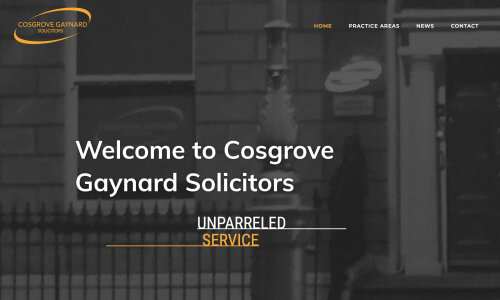Best Private Equity Lawyers in Dublin
Share your needs with us, get contacted by law firms.
Free. Takes 2 min.
List of the best lawyers in Dublin, Ireland
About Private Equity Law in Dublin, Ireland
Private Equity (PE) involves the investment of capital in private companies or the privatization of public companies, usually with the goal of restructuring, growing, or eventually selling the company for profit. Dublin has established itself as a major hub for private equity in Europe, benefiting from Ireland's favorable regulatory and tax environment, its access to the European Union single market, and a strong local network of financial and legal professionals. Private equity deals in Dublin typically include investments, buyouts, mergers, acquisitions, and venture capital transactions spanning many industry sectors.
Why You May Need a Lawyer
Engaging in private equity transactions can be complex, involving significant sums of money and multiple stakeholders. Here are some common situations where you may require the assistance of a legal professional in Dublin:
- You are looking to invest in or acquire a private company and need help with due diligence and negotiation.
- Your business is seeking private equity investment to fuel expansion or restructure debts.
- You are preparing to exit a private equity investment and want to optimise your returns while managing risk.
- You need to structure investment management entities in compliance with Irish law.
- You require guidance on tax, regulatory compliance, or cross-border investment issues.
- You need documentation drafted or reviewed, including shareholder agreements, acquisition agreements, or financing arrangements.
- You are involved in a dispute arising from a private equity investment.
Local Laws Overview
Ireland’s legal framework for private equity is highly developed and internationally recognised. Key aspects include:
- Company Law: Transactions are largely governed by the Companies Act 2014 and its subsequent amendments, stating requirements for company formation, management, and reporting.
- Financial Regulation: The Central Bank of Ireland regulates investment funds, certain private equity vehicles, and compliance with anti-money laundering requirements.
- Taxation: Private equity investments are affected by Ireland’s corporate tax regime, stamp duty, capital gains tax, and specific reliefs or incentives for certain investment structures.
- Contract Law: Robust contract law underpins investment agreements, purchase agreements, and partnership agreements.
- Employment Law: Transactions involving buyouts or mergers may trigger workforce consultation obligations or employment law considerations.
- EU Regulations: As a member of the European Union, Ireland adheres to various EU directives on financial services, competition law, and cross-border capital flows.
Frequently Asked Questions
What is private equity?
Private equity refers to investment in private companies or buyouts of public companies that are then taken private. Investors typically aim to increase the company’s value before selling their stake.
What are the typical stages of a private equity deal in Dublin?
A private equity deal often includes sourcing investment opportunities, due diligence, negotiation, agreement drafting, financing arrangements, closing, and post-investment management.
What role does Irish law play in structuring private equity funds?
Irish law facilitates the formation of various fund structures suitable for private equity, such as Limited Partnerships, Investment Limited Partnerships, and ICAVs (Irish Collective Asset-management Vehicles).
Are there restrictions on overseas investors in Irish private equity?
Ireland’s open economy welcomes foreign investment. However, certain sectors (such as financial services or critical infrastructure) may trigger additional notification or approval requirements.
How is the tax treatment of private equity gains handled in Ireland?
Tax treatment depends on the fund’s structure and the investors’ profiles. Capital gains, dividend income, and interest income may be taxed differently. Specialists can advise on optimizing tax efficiency.
What is due diligence and why is it important?
Due diligence involves a detailed review of the target company’s legal, financial, and operational affairs. It aims to uncover risks, verify claims, and protect the investor’s interests.
What kind of legal documents are required in a private equity transaction?
Typical documents include share purchase agreements, subscription agreements, shareholder agreements, warranties, disclosure letters, and financing documents.
Can disputes arise in private equity deals?
Yes, disputes may arise over valuation, post-completion adjustments, breaches of warranty, or governance. Early legal guidance can help mitigate risks and handle any disputes efficiently.
How does employee involvement factor into private equity transactions?
Irish law may require information and consultation with employees if a business is restructured or transferred, especially in large transactions.
Do private equity activities in Dublin require regulatory authorization?
Yes, certain private equity activities or entities may require authorization or registration with the Central Bank of Ireland, particularly if operating as collective investment schemes or fund managers.
Additional Resources
People seeking further information or support on private equity law in Dublin can turn to:
- Central Bank of Ireland - Regulator for financial services providers and investment funds.
- Irish Funds Industry Association - Represents collective investment fund managers and service providers.
- Companies Registration Office - Registry of Irish companies, filings, and related information.
- Enterprise Ireland - Government agency supporting business funding and investment.
- Law Society of Ireland - Directory for qualified solicitors and legal guidance.
Next Steps
If you believe you need legal assistance regarding private equity in Dublin, consider the following steps:
- Define your objectives, such as investment, fundraising, acquisition, or company restructuring.
- Gather all relevant documents and information about your current circumstances.
- Consider engaging a solicitor or law firm with a strong track record in Irish private equity law.
- Ask for an initial consultation to clarify your options and potential legal risks.
- Ensure you understand the costs, timelines, and possible outcomes before proceeding with any transaction.
Professional legal guidance is crucial to navigating the regulatory, contractual, and tax considerations inherent in private equity. By consulting with a qualified lawyer, you can help protect your interests and maximize your opportunities in the dynamic Dublin private equity market.
Lawzana helps you find the best lawyers and law firms in Dublin through a curated and pre-screened list of qualified legal professionals. Our platform offers rankings and detailed profiles of attorneys and law firms, allowing you to compare based on practice areas, including Private Equity, experience, and client feedback.
Each profile includes a description of the firm's areas of practice, client reviews, team members and partners, year of establishment, spoken languages, office locations, contact information, social media presence, and any published articles or resources. Most firms on our platform speak English and are experienced in both local and international legal matters.
Get a quote from top-rated law firms in Dublin, Ireland — quickly, securely, and without unnecessary hassle.
Disclaimer:
The information provided on this page is for general informational purposes only and does not constitute legal advice. While we strive to ensure the accuracy and relevance of the content, legal information may change over time, and interpretations of the law can vary. You should always consult with a qualified legal professional for advice specific to your situation.
We disclaim all liability for actions taken or not taken based on the content of this page. If you believe any information is incorrect or outdated, please contact us, and we will review and update it where appropriate.















